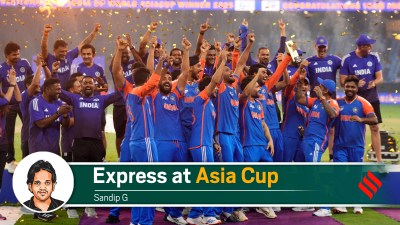To cushion fuel hike, Andhra cuts sales tax, others states under pressure
Andhra Pradesh, which levies the highest sales tax on petrol (34 per cent) brought it down to 33 per cent today while paring down tax on diesel to 22.5 per cent from 23 per cent.

Andhra Pradesh, which levies the highest sales tax on petrol (34 per cent) brought it down to 33 per cent today while paring down tax on diesel to 22.5 per cent from 23 per cent.
With Congress-ruled states toeing the Centre’s line by cutting tax, the pressure is now on the Left and the BJP to provide relief to the common man as they rule states where sales taxes are among the highest in the country (see chart).
The states, on their part, are also looking at this elbow room—cutting taxes—with the prospect of a rollback getting dimmer.
The lowest tax on petrol is 20 per cent in eight states. For diesel, it is the lowest at 8.8 per cent in Punjab and the highest at 37.72 per cent in Mumbai, Thane & Navi Mumbai.
The Congress states were first off the block when Petroleum Minister Murli Deora requested chief ministers of all states to cut taxes so that they are revenue-neutral. The hike in petrol and diesel price has given the states an additional Rs 2,000 crore in sales tax. ‘‘It is my earnest appeal to you that your state may at least forego the incremental sales tax on the current increase of Rs 2 and Rs 4 on diesel and petrol respectively. This step would have no impact on the budgeted state revenue,’’ Deora wrote to the CMs.
Maharashtra was the first one to announce a cut in taxes but would take a final decision next week after the cabinet approval. Sheila Dikshit in Delhi has also said that the state would consider on Tuesday ways to reduce the burden of the hike.
Tamil Nadu, said oil ministry officials, has ruled out a tax cut but has offered to pump the incremental gain into subsidising bus fares so that tariff remains unchanged for the commuters.
However, if West Bengal were to heed Deora’s advice, price of petrol would drop by 77 paise per litre to Rs 50.30 per litre while that of diesel would be down 36 paise to Rs 34.60 per litre, said the officials.
Besides, they say, the Left and BJP states also have the option to pare their tax rates closer to the average of 30 states and Union Territories, a step that would help share the consumers’ burden.
This concern was raised by the Rangarajan Committee which went into pricing and taxation of petroleum products: ‘‘Coming on top of what is considered a large incidence of excise duties, heavy sales tax levies lead to a high degree of cascading.’’
It suggested that the Empowered Committee of State Finance Ministers, which is introducing VAT in phases, should also be entrusted with the task of evolving a uniform policy on sales tax on petroleum products.
Fuel hike: BJP to go ahead with satyagrah
• New DELHI: Unfazed by the Congress ‘‘diversionary tactic’’ of reducing sales tax on petroleum in states ruled by it, the BJP has vowed to go ahead with the ‘‘satyagrah’’ plan against fuel hike from June 12. Former prime minister Atal Bihari Vajpayee is expected to lead the protest by NDA leaders here.
BJP spokesman Prakash Javadekar said the Congress was trying to divert people’s attention from the real issue. He said, ‘‘The Centre is resorting to high taxation in the form of excise duty. In the petrol cost structure, 49 per cent is fuel cost, 31 per cent Central taxes and 16 per cent average sales tax.’’
Asked if BJP-ruled states would emulate the example of Congress states, Javadekar said they could not do anything in isolation. It would be more appropriate if the Centre took the lead and called a meeting of CMs and finance ministers of all states and worked out a consensus on a uniform sales tax. — ENS





- 01
- 02
- 03
- 04
- 05


























